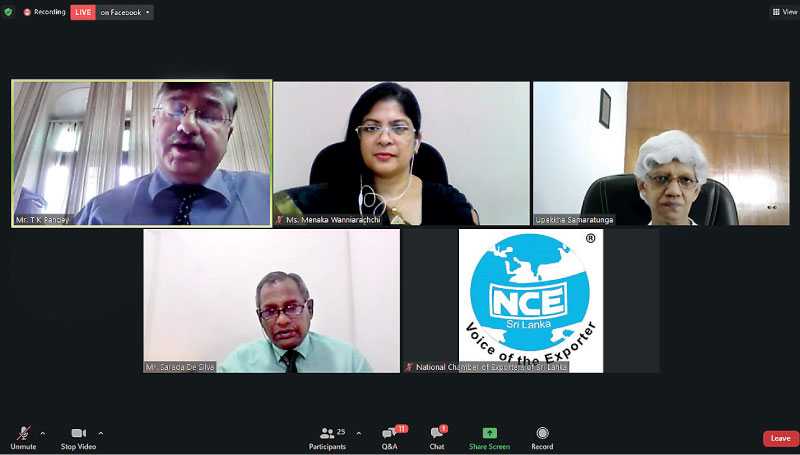Wednesday Feb 25, 2026
Wednesday Feb 25, 2026
Thursday, 20 May 2021 03:48 - - {{hitsCtrl.values.hits}}

The National Chamber of Exporters of Sri Lanka, addressing numerous issues faced by its member exporters instigated a series of webinars under the theme ‘Grow Beyond Traditional Markets’ in collaboration with Sri Lankan Foreign Missions overseas.
The main objective of this initiative is to assist exporters in finding new markets by identifying emerging demand for various products and services under the new normal by global consumers. Keeping abreast with the program, the Chamber conducted a webinar under the title ‘Improving Market Access to India’ on 21 April, in coordination with the High Commission of Sri Lanka in New Delhi and Indian Importers of Chamber of Commerce, with which the NCE has signed up an MoU to facilitate two-way trade between the two countries.
Representing the High Commission, Minister Commercial Upekha Samaratunge addressed the participants jointly with Indian Importers Chamber of Commerce Director Y.K. Pandey. The webinar was moderated by Past President of the Chamber Sarada de Silva.
Making the opening remarks, Samaratunge made a presentation stating that India is Sri Lanka’s number one trading partner with a $ 3.6 billion value of exports which accounts to about 14.1% of Sri Lanka’s total exports. She further stated that Sri Lanka’s current market share in India is around 0.2% only, indicating an enormous potential for growth in exports. Highlighting the current market scenario in India and outlining the Indian economy, she mentioned that the Indian economy is also going through a recession due to the global economic condition. However, there is a shift in the consumer trends and supply chains and Indian consumers tend to look for immunity boosting food items under the prevailing condition. Further, on the supply chain side, there is a shift towards the e-commerce.
It was mentioned that currently, the key exports to India are apparel, black pepper, animal feed, vegetable fat, insulated wires/cables, processed food, rubber based products, cloves, etc. and analysing the trade between the countries, the total exports from Sri Lanka stood at $ 70.1 million by 2020 and it has increased to $ 604.5 million, which is a remarkable achievement. The main trade tool to facilitate trade between Sri Lanka and India is the Indo Sri Lanka Trade Agreement and utilisation rate for Sri Lankan exports under the ISFTA is around 60% and the imports stands at 5%.
Main products exported under the ISFTA are tea, porcelain products, rubber based products, furniture, ceramic and apparel. However, under the new normal condition, some of the potential export items are vegan and organic food products, herbal teas, electronic accessories, packaging industry related products which require vigorous promotion and marketing by Sri Lanka. It was also noted that Sri Lankan products should be easily assessable and affordable to Indian consumers. Investment facilitation to Sri Lanka should also be focused on, whilst improving trade facilitation between the two countries.
Addressing the participants Pandey stated that under the prevailing global condition, the Indian Government is encouraging domestic industries under the ‘Made in India’ policy. Quantity restrictions on imports under ISFTA, for products such as apparel, pepper, desiccated coconut have been imposed through import licensing, pre-registration of importers under ISFTA for standard regulations and Vanaspati as well as minimum import prices placed on products are also issues.
He further stated that the demand for quality tea is increasing, especially Ceylon green tea in India. There is a high demand for Sri Lankan Gem stones, and he mentioned that these unique products should be marketed well, as Indians have Vastu and other religious beliefs wearing gems and precious stones. It is also important to establish exclusive shops, and have a verification mechanism to ensure the customers are assured the products are genuine and is of high quality.
Indian Importers Chamber of Commerce (IICC) has its representation in all commercially important cities in India and has representatives in 62 locations world-wide and IICC is ready to support the Sri Lankan Exporters in reaching the Indian market by connecting the right type of business partners, both importers as well as investors and vice versa for Indian businesses, Pandey stated.
Finally, responding to questions raised by the virtual participants with regard to non-tariff barriers in exporting to India, Samaratunge stated that enforcement of CAROTA 2020 is also an issue as this has empowered the Indian Customs to verify documentation with more information, which translates in to cumbersome procedures when exporting from Sri Lanka. In addressing such issues, the Minister Commercial highlighted that it is important the Exporters provide all relevant details as to why the documents are being held up, the relevant port in India and details about the shipment such as invoice numbers, Cusdecs, etc. in order for the Mission to work on resolving the issue in an effective manner.
In addressing the low utilisation rate of the ISFTA, by the Sri Lankan exporters, Minister Commercial mentioned that our export basket is limited. Further it was highlighted that the import quotas have not been fully utilised, due to the mindset of the exporters, as they complain on Non-Tariff Barriers etc., and yet not taking an effective action to explore other opportunities available in Indian Market.
The webinar received a high response from participants and the Chamber is planning to conduct more webinars of similar type with other countries where Sri Lanka currently maintains strong trade relationships in collaboration with respective foreign missions and trade chambers.